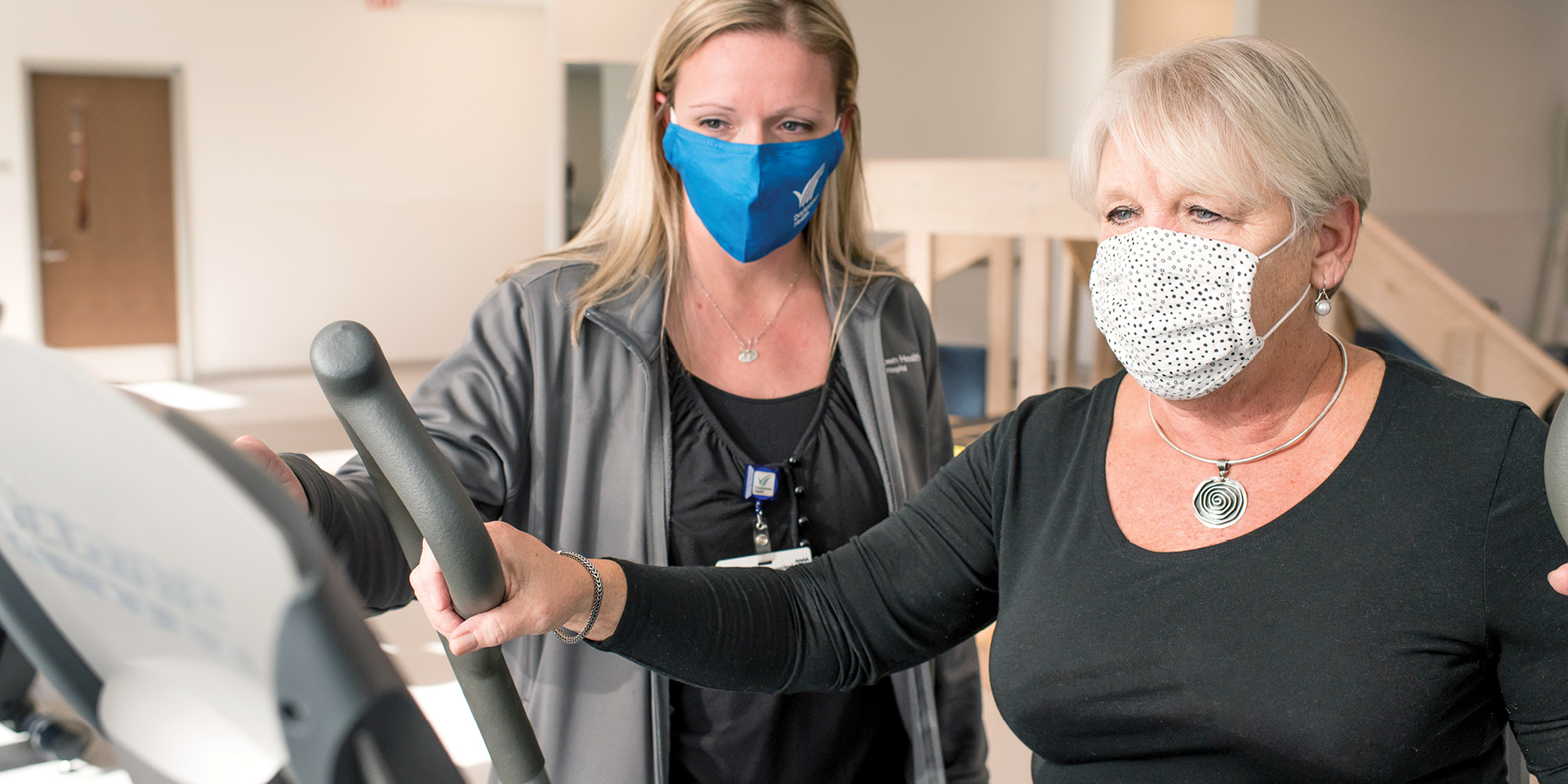Chemotherapy and radiation therapy can be lifesaving treatments for some cancer patients. However, these cancer-fighting therapies can have potential cardiovascular consequences. Doylestown Health’s innovative Cardio-Oncology Program is helping patients manage their cardiovascular risk as they move through treatment and into survivorship.
An Integrative Approach to Wellness
Once cardiovascular risk is determined and cancer patients are referred to the Cardio-Oncology Program by their oncologist or breast surgeon, they meet with cardio-oncology nurse navigator Kassie Richman. Kassie coordinates tests, records and cardiology appointments for these patients and connects them with other Doylestown Health services to facilitate their journey to wellness. These services are another part of Doylestown Health’s integrative approach to medicine, combining traditional treatments with complementary, customized therapies. Examples include patient referrals to Doylestown Health Nutrition Services, Cardiac Rehabilitation and Physical Rehabilitation Therapy.
Nutrition Services
Doylestown Health makes free nutrition counseling available to cancer patients during treatment and for a year post-treatment. Cardiac and oncology patients also receive a discount on The Simple Weigh, which is Doylestown Health’s simplified weight management program. In addition, patients can participate in a virtual supermarket tour with Doylestown Health Dietitian Debbie Davis, where they can follow her aisle by aisle, as she decodes food labels, highlights healthy choices and answers questions.
While undergoing cancer treatment, Debbie Davis, who is board-certified in oncology nutrition, says that the primary goal is “to help oncology patients maintain their weight. When these patients lose weight, a significant portion of that weight loss tends to be muscle. Weight loss can make them more fatigued, then they don’t tolerate treatment as well.” Doylestown Health Nutrition Services also aids patients who have been given specific diet guidelines by their cardiologist, such as limits on sodium or fluid intake.
Once treatment has ended, Nutrition Services counsels patients on eating healthily for the rest of their lives. A plant-based, anti-inflammatory diet low in saturated fat and high in fiber is recommended. Debbie describes a plant-based diet as comprising “at least six servings of fruits and vegetables per day, plus whole grains, beans, legumes, seeds and nuts, and plant-based oils.” Patients are steered toward more whole foods and less processed foods to avoid high sodium and added sugars. And they are given lifestyle tips such as avoiding alcohol, which can metabolize into carcinogens.
Cardiac Rehabilitation Services
“When ill and going through cancer treatments, deconditioning occurs, meaning that there is muscle loss, including heart muscle, and the immune system is weakened. Exercise reverses some of these consequences,” says Dave Martens, clinical manager of Cardiac Rehabilitation at Doylestown Health.
Patients come to cardiac rehab with a cardiac diagnosis. Clinically trained exercise physiologists and cardiac rehab nurses work with them around their cancer treatments and on their better days. Patients’ medical records and health history are reviewed, they are given a physical, and their cardiorespiratory fitness is assessed using a treadmill test. “These evaluations result in an exercise prescription customized around the needs of each patient,” Dave explains. “The goal is to gradually and safely condition the heart, increase heart function and achieve a heart-healthy lifestyle.”
Physical Rehabilitation Therapy
When deconditioning is accompanied by swelling, peripheral neuropathy (nerve damage) from chemotherapy, and/or movement aches and pains, cardio-oncology patients are referred to Doylestown Health Rehabilitation Therapy.
Rehabilitation therapy can also help with cancer fatigue. Patients may feel very tired during cancer treatment and might assume that exercise would make them more tired. Mona Dunlap, clinical manager of the Clark Outpatient Rehabilitation Center at Doylestown Hospital, says that, in fact, “Exercise helps battle cancer-related fatigue, acting as a mood-elevator and improving endurance and quality of life.”
Patients are assessed and prescribed an exercise regimen. Mona notes that, “There is a good research about the benefits of strength training for cardiac patients, in addition to cardiovascular exercise.” Therapists also address aches and pains and gait and balance issues that may have resulted from cancer treatment-related nerve damage. Patients can ask their physician for a script if they think they can benefit from physical therapy.
About Doylestown Health Cardio-Oncology
Doylestown Health Cardio-Oncology Program, one of only a handful of programs of its kind in the region, strives to improve the cardiovascular health of patients with cancer and cancer survivors by offering access to early cardiovascular assessment, intervention and treatment.
About Doylestown Health
Doylestown Health is a comprehensive healthcare system of inpatient, outpatient, and wellness education services connected to meet the health needs of the local and regional community. The flagship of Doylestown Health is Doylestown Hospital, a not-for-profit, community teaching hospital with 245 beds and a medical staff of more than 600 providers who deliver the highest quality care in over 50 specialties. Renowned locally, regionally, and nationally, Doylestown Hospital provides superior healthcare and offers advanced surgical procedures, innovative medical treatments, and comprehensive specialty services. Serving Bucks County for over 100 years, Doylestown Hospital is proud to educate and train the next generation of physicians through its family medicine residency program. Ranked as one of the World’s Best Hospitals by Newsweek and 9th in Pennsylvania, Doylestown Hospital is distinguished in both infection prevention and patient experience. Doylestown Hospital is the only hospital in Pennsylvania to achieve 18 consecutive ‘A’ grades for patient safety from Leapfrog Hospital Safety Grade. Learn more at doylestownhealth.org.
